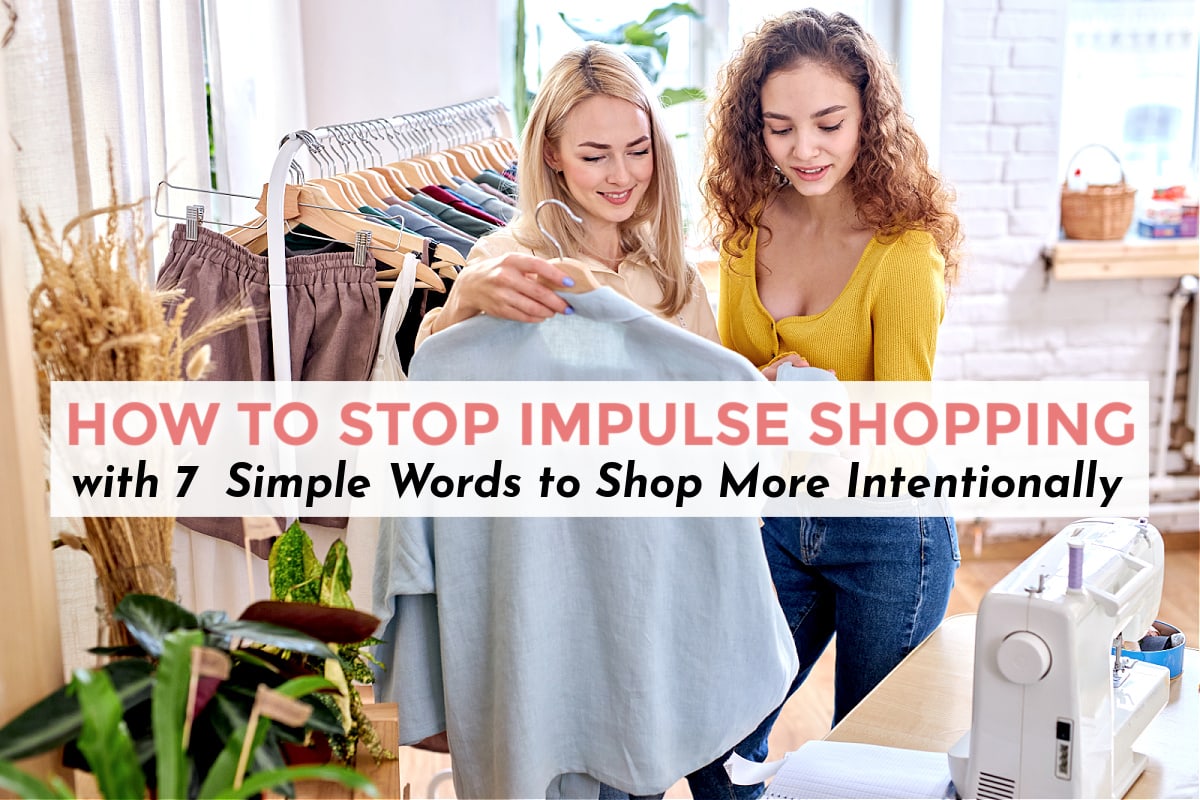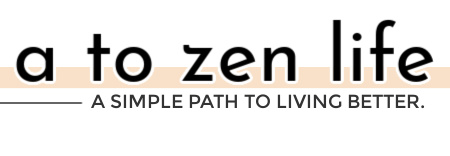7 Words to Make Intentional Shopping a Habit for Life
This post may contain affiliate links for your convenience. That means that if you make a purchase, I will receive a small commission at no extra cost to you. Read more here.
Intentional shopping is a habit that can benefit your wallet, the environment, and your home. However, in a society that bombards us daily with thousands of messages to buy more, better, and bigger, it can be challenging to develop this habit of intentional buying – but it’s so worth the effort!
When you do, you create more space in your life for the things that matter the most to you.
If you’re new to this concept and the idea of shopping like a minimalist, don’t worry because you’ll find out what intentional shopping is, why it’s important, and learn seven simple questions to help you with intentional buying going forward.
Let’s dive in!

🛍 What is intentional shopping?
Intentional shopping is the act of being mindful and purposeful with your spending. It’s about making choices that reflect your values and needs instead of letting emotions or outside influences dictate what you buy.
Shopping intentionally also means taking your time and being fully present. Instead of rushing through life and making impulsive decisions, you’re slowing down and taking the time to think about what you need and why you need it.
🤔 What are the benefits of shopping intentionally?
You might ask yourself, “What’s in it for me?” Why should you make an effort to be more intentional with shopping?
Here are five reasons to become an intentional buyer; which one appeals to you the most?
1. Save money
Intentional shopping can help you save money and feel more financially secure. When you take the time to think about your purchases, you’re less likely to engage in emotional buying or overspend on items you don’t need.
Think about the last thing you purchased; how much did it cost? Now think about how you paid for that product or service – how many hours did you have to work to earn money to pay for it?
Was it worth it?
Remember, the goal here isn’t to make you feel guilty about spending money because that in and of itself is not bad. Instead, it’s to encourage you to think about your money in a new way to help you spend less and save more money.
READ MORE: 7-Step Guide to Financial Minimalism (and a Richer Life)
2. Conserve time and energy
Speaking of which, it is an irrefutable fact that as we move through life, we expend time and energy doing so. Just as it is important to be mindful of the physical resources we use daily, it is essential to be aware of how we use our time and energy.
When you stop and think about it, you notice how much goes into the deceptively simple act of swiping your credit card to buy.
Buying can involve:
- physical work to earn money needed to buy.
- research that goes into finding products, comparing them, and hunting for coupons or ways to save money.
- travel time spent driving to purchase or screentime looking to buy online.
- upkeep, maintenance, and storage activities.
- and more…
3. Less clutter
Studies show that excess clutter in a home can cause anxiety, making you feel stressed out and overwhelmed in a place that should be your oasis.
Given that the average American home has more than 300,000 items in it, is it any wonder that reports are pouring in that 84% of Americans worry their homes aren’t organized enough, and 55% say it’s a significant factor in their daily stress?
One of the biggest benefits of being mindful about your purchases is that it can help to reduce the amount of clutter in your home and life. Not only does this make it easier to keep your living spaces tidy, but it can also improve feelings of contentment, happiness, and life satisfaction.
FIND OUT MORE: Read more about this side-effect and find links to additional research in this blog post about the benefits of minimalism.
4. Reduce environmental impact
Another great reason to be an intentional shopper is that it can help reduce your environmental impact. We wear clothes 36% fewer times than we did 15 years ago, and the average person in the US throws away around 81 pounds of clothes each year, of which only 13.6% are ever recycled.
And it’s not just textile waste, but many household products, from food to cleaning to beauty products, come with packaging that’s difficult or impossible to recycle.
When you take the time to consider your purchases and whether or not you need them, you can avoid becoming a bigger part of this problem.
5. Be Happier
The moment you decide to step out of the hamster wheel of mindless consumerism is the moment you become free.
Free to focus on what actually brings you joy, rather than what society tells you should own or do to be happy.
“Happiness is inward, and not outward; and so, it does not depend on what we have, but on what we are.”
– Henry Van Dyke
🛒 How to start intentional shopping right now
Now that you know the benefits of intentional spending, it’s time to put that knowledge into practice. Here are a few tips on how to make intentional buying a habit for life.
These intentional shopping questions are easy to remember. In fact, you probably already know them by heart!
They are based on the 5 Ws of English grammar, with two bonus questions thrown in to help you dive even deeper into the psychology of buying – your psychology!
Self-knowledge is powerful. Knowing yourself is the first step in changing your behaviors and habits to learn, grow, and flourish.

1. Ask why you want to buy
The next time you’re preparing to buy something, look inward and ask yourself, “Why?” What feelings or motivations are driving you to spend that money and make that purchase?
When you take the time to get honest with yourself about your spending impulses, you may be surprised at what you discover.
Often, we buy things to fill a void or meet a need that has nothing to do with the item itself. Who can’t relate to these song lyrics?
“There’s a big black hole where my heart used to be
And I’ve tried my best to fill it up with things I don’t need
It don’t work like that, no, it’s not easy
To fill this gap that you left in me”
Griff, Black Hole
To practice intentional shopping, do your best to make sure your why aligns with your values and goals, and you’ll be less likely to waste money and buy something you regret in the future.
2. Who is this for?
This might seem like such an obvious question to ask, but answering this question is less intuitive than you might think. If you love giving gifts, you should put yourself in the receiver’s shoes and ask if it’s something they will enjoy. Remember, experiences almost always trump material gifts.
But even when you think you’re shopping for yourself, how often have you found yourself buying things to impress someone else or because you’ve been told it’s the “right” thing to do?
Once upon a time, I loved to read magazines, and I read in Cosmopolitan that blazers were the must-have item every girl should have in her closet. The models gave off this aura of being chic, put-together, and effortlessly cool – everything I thought I wanted to be at that time.
Never mind that I’d never worn a blazer before in my life, I went right out and bought three new blazers to spruce up my wardrobe – only to discover that I hated wearing blazers!
I found them stiff and uncomfortably restrictive.
The white lab coat I wore at my hospital job was much more practical because it had enough pockets to carry everything I needed from patient to patient. It also protected me from spit, food, and all the other fun stuff encountered in the line of duty (sorry for the yuck factor, just keeping it real).
As my non-work hours were more likely to be spent doing chores, reading, or going to the grocery store than going to cafes or spending a day at a country club, comfortable T-shirts and sweaters were more my vibe.
After starting this journey to be more intentional, I promised myself I would stick with clothes that felt like the real me from then on. I talk more about that and the things I don’t buy anymore as a minimalist in this blog post.
3. What’s the purpose or value of this thing?
What is it that you value in your life? When you wake up each day, what are the fundamental beliefs and principles that motivate, inspire, and guide you forward?
Are you spending money on things that align with those values and motivations?
I read an interesting quote the other day:
“Don’t tell me where your priorities are. Show me where you spend your money, and I’ll tell you what they are.”
– James W. Frick
Shopping with intention means putting your money where your mouth is and aligning your spending habits with your values and beliefs.

RELATED POST: 50 Intentional Living Quotes to Inspire a Life of Purpose and Meaning
4. Where to put it in your home?
One of the most important questions you can ask yourself before purchasing is, “Where will this go in my home?”
All too often, we buy things on a whim without thinking about the space it’s going to occupy and if we have room for it or not. If your entire dresser is packed to the point that you can’t shut it, that’s a pretty good indicator you don’t need to buy more clothes but declutter them instead.
If you don’t have a specific spot for it, re-evaluate whether you need the item.
5. When do you need this?
The next question to ask yourself is when you need the thing you are buying. Time is the fourth dimension, after all, and not to be ignored.
If your buying habits are not congruent with your when that means you’re living out of alignment with your present. This can occur when you shop for your past or future self and is especially common with fantasy self clutter.
Here is an example: “This dress will look amazing on me when I lose 30 lbs, and it’s on sale! I’d better buy it now, or I might not find something as good later.”
Not only is the buyer shopping for a future self that is not guaranteed, but she’s also engaging in scarcity mindset thinking.
Instead of buying for an idealized version of your past or future, shopping intentionally means buying what your current and authentic self needs and loves. Don’t buy things that are too far in the future or past.
6. Which brand or model is best?
How many times have you bought something on a whim, only to find out that it didn’t meet your expectations?
When you take your time, research, and shop mindfully instead of impulse buying or rushing to grab the first thing you see, you’re more likely to be pleased with your purchase. This goes for everything from toasters to houses.
Here are comparisons to run:
- price
- features
- brand vs. brand (i.e., Subaru or Honda)
- model vs. model (i.e., Subaru Crosstrek vs. Subaru Outback)
- location
- customer reviews
- and more.
Of course, there’s always the possibility that you do all the research and still buy something you don’t like, which happened to my husband when we purchased a new car three years ago – major buyer’s remorse!
7. How much would this cost me?
What is the true cost of the item? It’s important to consider what things cost, not just in time but also in real and opportunity costs.
How much money will you need to continue spending to store and maintain the item? Does it require additional parts or accessories right now or to keep it up and running later? And how much time will it cost you to do all of that?
When you buy a home, you are responsible for the upkeep and maintenance of that home. If the dishwasher breaks or the garage door stops working, that’s on you to fix.
As far as opportunity costs, when you put your money into your home that might mean passing up on having enough liquid cash to invest in the stock market at the right time or turning down your dream job to work in Paris because you’re less mobile.
Life is a perpetual flux of give and take, sacrifice and gain, and it’s all about weighing your options to make the right choice for you!
RELATED POST: Top 10 Truths About the Value of Time in Life
💸 Watch This YouTube Video on how to shop more intentionally
✨ Final thoughts on intentional shopping
Intentional shopping is a great way to save money and live a more sustainable lifestyle. It’s all about being mindful of what you’re buying and why you’re buying it.
By asking yourself a few simple questions before making a purchase, you can ensure that you get the most bang for your buck and are less likely to buy something you regret. Also, it might seem like a lot to think about now, but I promise the process will become easier and faster the more you do it.
Are you an intentional shopper? Do you have any stories about times you succeeded or failed to spend mindfully? Drop them in the comments below!
If you want more ideas on how to get started with minimalism and saving money, here are two posts to read now:
- How to Build a Minimalist Wardrobe You ADORE in 10 Steps
- 25 Minimalist Habits for a Richer and Happier Life
📌 Pin this post to read or share!


Today I nearly failed 😣. My favorite brand has sale and I got a note from them yesterday on email and of course I read it and found a pants 👖 to good price and I thought I would need. Then I realize I already have three pants from this brand with I love to wear and use) and three pants in my wardrobe are enough for me in my life. Instead of buying them I left the brand webpage and walk to your blog instead. That was hard but now I am very happy I didn’t buy anything 😊 and to this winter I probably will need this money to pay power bills instead. Thank you 🙏
What an awesome coping strategy! Glad you were able to prevent that impulse buy, you rock. 👊
As one who had almost nothing as a child in the late 1960’s I found myself hanging on to everything because of the “You might never get another one” mentality. I have been thru the “I bought too many” because of this engrained in me, but now that I am older I look at things more in the “Can you take it with you ?” mentality. Meaning – (exp) Theres a major storm coming, we need you all to evacuate in two hours “What can I take, that I need to survive anywhere else ?” — What if you were to come “home” and there was nothing there ? (fire, flood, tornado, hurricane, gas leak) — Think of the “basic’s you need to survive anywhere else, forever” and declutter as it helps mentally freeing your mind of stress which reduces your blood pressure, helping your health. One day when or if you ever need “it” again, you can go get yourself one thats suit’s your need’s “better”.